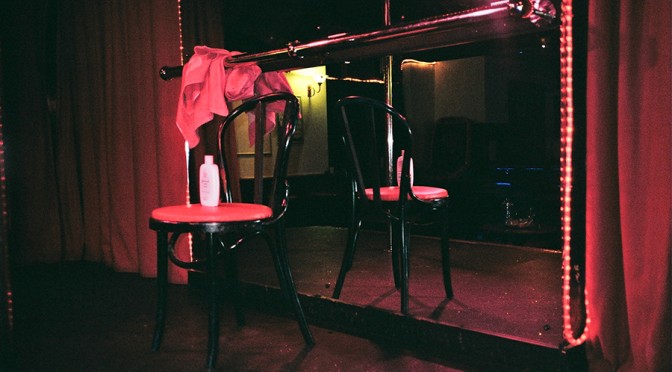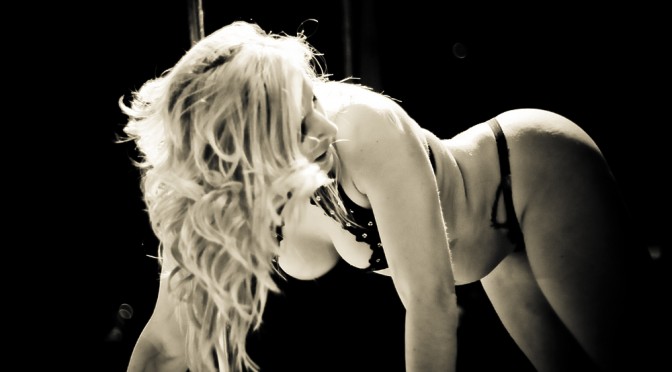Stripper and activist Edie Lamort muses on the devastating effects of gentrification on the strip pub scene she knows and loves.
“I feel like an endangered species that is becoming extinct because my natural habitat is being destroyed.” – Solitaire
Protect The Wildlife
As the the Tsunami of gentrification crashes through my city, laying waste to communities and culture, leaving it like driftwood in its wake, I wonder how long my industry will survive. My industry is the traditional strip pub. Not the glossy US style corporate club but the family owned strip pub with jug collections and stage shows. The place where customers relax at the bar without being pestered for private dances and where we are individual showgirls not identikit sexbots. But the whole pub industry is in freefall no matter what kind of entertainment they have. Pubs up and down the land stand ruined and concealed in hoardings as landlords go out of business and breweries go into administration. The Peel in South London closed down in April because the brewery, Punch Taverns, is in so much debt that it needs to sell off the land to property developers. It was such a quirky place inside with a wonderful old vaudeville-esq stage, so that the dancers would call it Twin Peaks. It was also a live venue that hosted band nights promoted by indie record labels. Many a famous name in music has played there. When it closed the landlord said to me, ‘They just want to destroy all alternative culture.”
On Monday 21st July the bulldozers moved in to raze it to the ground. It will now be turned into ‘luxury’ flats, the biggest con of our age.
So as the time comes for me to hang up my G-String, here are the things I will desperately miss about being a Striptease Artiste!
The Money
Well of course! This makes life so much fun; it is the lure and the second main thing that holds you to the job. You too can eradicate the crushing misery of poverty in a few easy shifts! Doors will open and opportunities will appear for you. Over the past few years I have had my feet in both worlds; ‘normal’ job and dancing and all I can say is ‘Thank God for dancing!’ The times it has covered the shortfall that ‘normal’ job wages haven’t are too numerous to count. I don’t claim in work benefits, instead I pole dance, but the need is the same. At least I can’t be called a scrounger, only a slut.
Performance
I recent asked a group of fellow strippers, “What’s the most important part of the job? The money or the performance?” The general consensus was that both are of equal importance and it was impossible to rank. We are creative, extrovert people who wither and die in office admin jobs. We like to display and play with the audience, to get the adulation and to flirt. You can be witty, you can be silly then you can be sultry and moody. Essentially you can express yourself when you are improvising a dance on stage. So many offices I’ve stepped into are like morgues, with browbeaten people repressed and under manners, radiating a low-level emission of desperation. I look at the guys and think, ‘Yup, you’ll be in Browns soon!’
In the traditional pubs we choose our music, our costume and choreograph our individual shows, therefore we get creative satisfaction. Copying someone’s show or music is frowned upon: think for yourself! Girls train on the pole at home and in dance schools to put on a great stage show. Creativity and performance are incredibly satisfying. Especially live performance as you have the immediate response of the audience. A few dazzling minutes on stage give you a confidence and pizzazz, a vitality and a certain élan.
As it is essentially a part time job for full time wages it allowed the creative types space to do other things. Shoreditch at its peak was a creative hub and dancers contributed to this. I did music, others ran dance troupes, set up club nights, made art, sculptures and designed clothes. We were part of a scene that was rich in ideas and creativity and that spawned many a mainstream fad.
Glamour
When you are earning money and performing to an adoring crowd you feel like a star. Things are not as good as they were in the Golden Age of Striptease – the 90s and the 00s – but up until the financial crash it had all the essential components of glamour, baby!
The sexual confidence, the allure, the looks, the self-possession and individuality. It was an environment that bred confidence and sass and allowed it to flourish. Dancers had the clothes, the cars, the luxury foreign travel and went to all the fashionable places because money makes that happen. They are also independent free spirits, the artists, the performers, the risk takers and life’s go-getters. Why sit at a desk job when you can dance and get all those things you always wanted? Dancers have attitude, wit and sass and they use it!
Freedom and Independence
I went on holiday to Thailand and met a group of friendly East Coast Americans. We kept in touch and one rainy Tuesday I spoke to one who said ‘Why don’t you come over for the weekend? We’re having party and you can stay here if you want.’ So I phoned Browns to cancel my week’s bookings. It was fine, there are plenty of girls who want to earn money and my shifts would easily be covered. I would just work more the next week and recover the money. Then I got out my credit card and booked a flight to NYC. By that evening I was in the US and at the party. This sense of freedom and independence is such a wonderful experience. You feel totally in control of your own life when you can choose your hours and generate your own financial security. Money in itself won’t make you happy but the opportunity and the freedom it brings will certainly help.
Being Physical
“Office work has ruined my life”, said an overweight and despondent looking customer to me, a few years ago. I didn’t understand what he meant until I started tentatively venturing into that landscape. When you are a dancer your job is a high paid workout. The strength and tone and the general feeling of health you get from being physical goes unnoticed, until you stop! Sitting for hours in an overly air-conditioned, uncomfortable environment with fluorescent lights overhead is bad for your health. Within a few months of working in an office I began to feel my strength ebbing away and to learn that there was such a thing as back fat. Your life becomes a fight against the sedentary weakening of your body, as feeder-like colleagues bring in biscuits and cakes, relentlessly! We are not designed to be so static and feeling your body in its peak of health, as it is supposed to be, is joyful.
Walking on the Wild Side
If you are a bit kooky see it as a blessing; why on earth would you want to be normal and boring? It’s not an enriching place to be hence people are drawn to the deviant and the risqué. The inhabitants of the traditional strip pub are the weird and wonderful multitudes of humanity and I mean that for everyone. The customers of course display most of these attributes but the owners, the bar staff, the DJs, the bouncers and the dancers are permitted to be themselves and to be self expressed. I delight in meeting the many varied and whacky people of the world.
From the OCD punters and the drunken morons, to the intensely clever and interesting guys, you will see all sides of humanity. We’ve had gay guys and older gentlemen with a penchant for cross-dressing, come out to us because they feel like it’s an environment they can be free in.
“Love them whores they never judge you, well what can you say when you’re a whore?” – Perry Farrell
Not that we are whores. I know how tetchy people get about language.
The dancers can be divided into ‘creative’ and ‘businesswomen’, with one or two nutters, and everyone becomes larger than life. You will also be at the forefront or each new wave of immigration so will meet people from all over the world, speaking many different languages. About 70% of my friends are immigrants because of this job. There is a sense of camaraderie that develops because we are demonized by society at large so we need to have each other’s backs. This has given me some of the best friends I’ve ever known. I have met the most outrageous characters, the most eccentric, the funniest, the smartest, the wittiest and the most independent, and thank God for that!
If you like music, art, fashion, performance and dance you will mourn the loss of the London subcultures, including dancing, because these are the places that spawn creativity. They are fragile ecosystems of low rent and liberal attitudes that allow the evolution of the ‘next big thing’: the next music trend, the next art movement, the next fashion and the next development in dance. They are nurseries of ideas and trends that feed into the mainstream and keep it alive and interesting. Without this fragile reef, the mainstream will become stale and drab, with nothing to feed it. As the corporate vandals smash through neighbourhoods I wonder how long it will take us to recover. Occasionally things will breakthrough and you will see a great band, hear a great DJ or see someone looking amazing. The urge will always be there and will ultimately triumph but right now things are looking drab.
Just remember, when you destroy the cultural ecosystem, it’s not just the animals that suffer.
(Photo of The Peel courtesy www.bronfilms.com).




